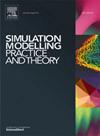Transfer-Mamba: Selective state space models with spatio-temporal knowledge transfer for few-shot traffic prediction across cities
IF 3.5
2区 计算机科学
Q2 COMPUTER SCIENCE, INTERDISCIPLINARY APPLICATIONS
引用次数: 0
Abstract
Spatio-temporal traffic forecasting significantly impacts the development of smart cities. Owing to uneven development levels and the substantial costs of data collection, many cities often encounter the challenge of limited data availability when undertaking traffic prediction tasks. This paper introduces Transfer-Mamba, a method that employs Spatio-temporal selective state space models with transfer learning for few-shot traffic prediction across multiple cities. Transfer-Mamba features a Spatio-temporal graph pre-training process, which incorporates an encoder–decoder architecture with a Mamba module and an adaptive graph convolutional network. This process enhances the feature representation and transferability of traffic data from multiple source cities by capturing Spatio-temporal correlations. To distinguish unique traffic patterns and data distributions in source cities, an unsupervised learning algorithm groups similar traffic characteristics during the Spatio-temporal knowledge clustering phase. These clustered patterns are then retrieved through a Spatio-temporal knowledge querying process, which extracts traffic meta-knowledge to guide the few-shot prediction phase for the target city. Extensive experiments conducted on four real-world traffic datasets demonstrate that Transfer-Mamba outperforms the existing mainstream baselines, which provides valuable insight for optimizing road traffic management.
转移-曼巴:基于时空知识转移的城市交通预测的选择状态空间模型
交通时空预测对智慧城市的发展具有重要影响。由于发展水平的不平衡和数据收集的巨大成本,许多城市在进行交通预测任务时经常遇到数据可用性有限的挑战。本文介绍了一种基于迁移学习的时空选择状态空间模型进行多城市短时间交通预测的方法transfer - mamba。Transfer-Mamba具有时空图预训练过程,该过程结合了带有Mamba模块的编码器-解码器架构和自适应图卷积网络。该过程通过捕获时空相关性,增强了多源城市交通数据的特征表示和可移植性。为了区分源城市独特的交通模式和数据分布,一种无监督学习算法在时空知识聚类阶段对相似的交通特征进行分组。然后通过时空知识查询过程检索这些聚类模式,提取交通元知识,指导目标城市的短时间预测阶段。在四个真实交通数据集上进行的大量实验表明,Transfer-Mamba优于现有的主流基线,这为优化道路交通管理提供了有价值的见解。
本文章由计算机程序翻译,如有差异,请以英文原文为准。
求助全文
约1分钟内获得全文
求助全文
来源期刊

Simulation Modelling Practice and Theory
工程技术-计算机:跨学科应用
CiteScore
9.80
自引率
4.80%
发文量
142
审稿时长
21 days
期刊介绍:
The journal Simulation Modelling Practice and Theory provides a forum for original, high-quality papers dealing with any aspect of systems simulation and modelling.
The journal aims at being a reference and a powerful tool to all those professionally active and/or interested in the methods and applications of simulation. Submitted papers will be peer reviewed and must significantly contribute to modelling and simulation in general or use modelling and simulation in application areas.
Paper submission is solicited on:
• theoretical aspects of modelling and simulation including formal modelling, model-checking, random number generators, sensitivity analysis, variance reduction techniques, experimental design, meta-modelling, methods and algorithms for validation and verification, selection and comparison procedures etc.;
• methodology and application of modelling and simulation in any area, including computer systems, networks, real-time and embedded systems, mobile and intelligent agents, manufacturing and transportation systems, management, engineering, biomedical engineering, economics, ecology and environment, education, transaction handling, etc.;
• simulation languages and environments including those, specific to distributed computing, grid computing, high performance computers or computer networks, etc.;
• distributed and real-time simulation, simulation interoperability;
• tools for high performance computing simulation, including dedicated architectures and parallel computing.
 求助内容:
求助内容: 应助结果提醒方式:
应助结果提醒方式:


